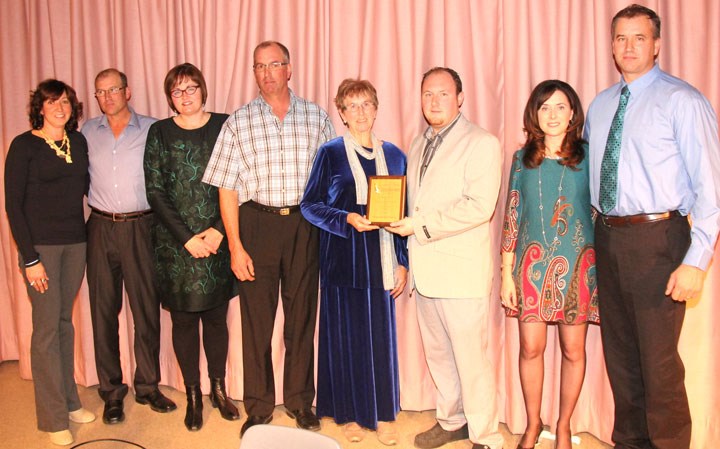The 2013 Golden Sheaf Award was presented on Nov. 5 to a family farm operation in the Creelman area, the Van Staveren family farm, operated by brothers John, Marcel and Vincent, and their wives.
The 2013 Golden Sheaf Award was presented on Nov. 5 to a family farm operation in the Creelman area, the Van Staveren family farm, operated by brothers John, Marcel and Vincent, and their wives.
The award, presented annually by the Weyburn Chamber of Commerce at the Farmer Appreciation Banquet, recognizes a number of areas, including innovation, longevity, community involvement and stewardship.
The farm was established in 1958 when the Van Staverens immigrated to Canada from the Netherlands; today, the three brothers farm a combined total of over 15,000 acres, and were noted to be among the first in the area to phase in new technology (like GPS and auto-steer), and were among the first to try growing soybeans in the area.
"It's amazing how the years go by; my father and uncles are no longer with us. I wish they were here to thank them for what they did," said John Van Staveren, whose involvement includes sitting on the board of directors of Weyburn Inland Terminal.
He told the gathered audience that if they still have their fathers with them, particularly the farmers, they need to be thankful they can still provide advice and input, and when needed, to lend a hand.
"Let's keep having fun and working hard," he said.
Brother Marcel described their farm life as a "great journey", and said, "The struggles are what we end up remembering, and how success has worked for us."
He added the brothers wanted to acknowledge the work and support of their wives who are "equal partners" in the venture of farming.
From his 10 years as owner of Precision Ag, to now when they deal with agri-businesses and implement dealers, Marcel said it's important to have the partnerships with businesses to help the farm operate.
He noted he's had the opportunity to travel to places like Argentina to see how soybeans are grown, and Ukraine to see their farming practices, and said he came back appreciating home all the more, particularly with the freedom to operate that they have here.
Marcel said part of their success has been due to learning and implementing new practices that have improved the health of the land and of the crops, such as zero-tillage, which prevents any possibility of a repeat of the infamous dust storms of the Dirty Thirties.
"Soil movement has gone away, and soil research helps to make sure what we're doing on the farm is sustainable," he said, noting that now soil organisms are thriving more than ever, due in large part to zero tillage.
He paid tribute to his parents who came in 1958 to farm in this area, and through hard work built the farm up and "taught us the value of a dollar".
"We want to live the same kind of life. We love farming, we love problem-solving and risk management; that's all part of the farm community," said Marcel, adding they would like to be able to pass the farm on to their family members eventually.
"God has certainly blessed us, and we don't take that for granted. That's why we farm," said Marcel, his voice breaking from emotion.
The men's mother, Elisabeth, said of her sons, "They work hard; they learned that from their father."
She noted that Canada is a beautiful country, but she found it hard here at first, and asked her husband if she might be able to return to Holland if she wanted.
"It was a relief to know I could go back; I never did. I could go home, but I didn't. This is the best place on earth," she said.
Prior to the award presentation, MLA Dustin Duncan passed on his comments on the importance of the ag industry, saying this year's harvest was one of the best-ever at 34.4 million tonnes, about 25 per cent above the 2012 harvest, and 33 per cent above the long-term average. He also noted that this province posted a record $11.2 billion in exports.
Speaking on behalf of city council, deputy mayor Mel Van Betuw noted that Mayor Debra Button works with the Ukraine through the FCM (Federation of Canadian Municipalities), and noted there is a strong Ukrainian heritage in this province "with almost identical soil conditions and crops", and primarily Ukrainian immigrants came here to be farmers, and in spite of the importance of oil, gas and potash, agriculture is still an important part of the economy.
"Many people don't have an accurate view of farming or farming operations.
Saskatchewan's sophistication in farming has paid off handsomely in Saskatchewan," said Van Betuw, noting as examples this province is a major producer of canola, and of 60 per cent of the lentils grown in the world.
From the RM of Weyburn, Coun. Ron Fellner noted that for today's farmers, land stewardship and soil conservation is more important than ever before, and said with the growth of agriculture, there has also been spinoff growth here as well as the "significant investments" that the farmers themselves make.
Chamber president Jeff Chessall said, "What a big year for crop producers, not only in producing a big crop, but the first year without the Wheat Board."
He added that farm business is not just the survival of the fittest, but of the adaptable, particularly as crops change and technology changes, creating challenges for all producers in agriculture. "The chamber has no doubt about producers and their ability to feed the world."
